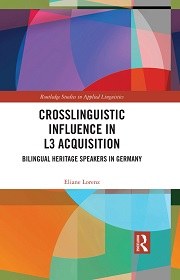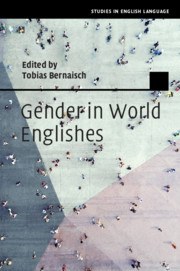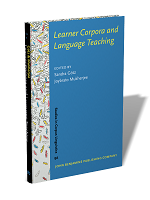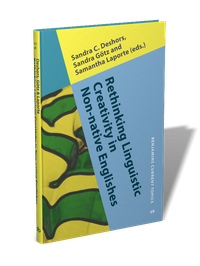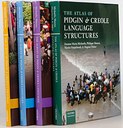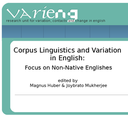Publications
Please click on the titles for further information.
- Heading 2022
-
Published in 2022
- Lorenz (2002)
-
About the volume:
This book explores crosslinguistic influence in third language acquisition, drawing insights from a study of young bilingual secondary school students in Germany to unpack the importance of different variables in the acquisition and use of English as an additional language. The study draws on data from a learner corpus of written and spoken picture descriptions toward analyzing sources of crosslinguistic influence in L3 acquisition in bilingual heritage speakers with unbalanced proficiency in heritage versus majority languages as compared with their monolingual German peers. This unique approach allows for a clearer understanding of the extent of influence of access to heritage languages, the impact of being a "balanced" vs "unbalanced" bilingual speaker, and the importance of extra-linguistic variables, such as age, gender, socio-economic status, and type of school. The final two chapters highlight practical considerations for the English language classroom and the implications of the study for future directions for research on third language acquisition.
With its detailed overview of L2 and L3 acquisition and contribution toward ongoing debates on the advantages of being bilingual and multilingual, this book will be of interest to students and scholars in applied linguistics, foreign language acquisition, foreign language teaching, and learner corpus research.
- Heading 2021
-
Published in 2021
- Bernaisch (2021) short
-
Bernaisch, Tobias, ed. 2021: Gender in World Englishes.
About the volume:
How do women and men from around the world really speak English? Using examples from World Englishes in Africa, America, Asia, Britain and the Caribbean, this book explores the degree of variation based on gender, in native-, second- and foreign-language varieties. Each chapter is rooted in a particular set of linguistic corpora, and combines authentic records of speakers with state-of-the-art statistical modelling. It gives empirically reliable evaluations of the impact of gender on linguistic choices in the context of other (socio-)linguistic factors, such as age or speaker status, under consideration of local social realities. It analyses linguistic phenomena traditionally associated with genderlectal research, such as hedges, intensifiers or quotatives, as well as those associated with World Englishes, like the dative or genitive alternation. A truly innovative approach to the subject, this book is essential reading for researchers and advanced students with an interest in language, gender and World Englishes.
- Heading 2019
-
Published in 2019
- Götz, Mukherjee (2019) short
-
Götz, Sandra & Joybrato Mukherjee, eds. 2019: Learner Corpora and Language Teaching.
About the volume:
While native corpora and corpus linguistic tools and methods have been used and applied for quite some time in the development of learning and teaching materials, learner corpora are only just beginning to impact the field of language teaching, testing and assessment. This volume helps to close this still existing gap and highlights the great potential of learner corpus research for language pedagogy by presenting a selection of 11 original studies on learner corpora, conducted by established experts as well as by excellent young researchers. The papers included in the volume present new corpora and methods, studies on written as well as spoken learner corpora and on using data-driven learning scenarios in the classroom.
All papers include sections on practical and concrete language-pedagogical applications. This volume will be of significant interest to researchers working in corpus linguistics, learner corpus research, second language acquisition and English for Academic and Specific Purposes, as well to language teachers and materials developers.
- Heading 2018
-
Published in 2018
- Deshors, Götz, Laporte (2018) short
-
About the volume:
At a time when the paradigm gap (Sridhar & Sridhar 1986) between the EFL and ESL research areas is attracting much scholarly attention, the contributions in the current volume explore this gap from the perspective of linguistic innovations across the two different types of non-native Englishes. In this endeavour, this volume unveils the many facets of linguistic innovations in non-native English varieties and explores the fine line between learners’ erroneous versus creative use of a target language. Adopting empirical, corpus-based approaches to portray linguistic innovations characteristic of EFL and ESL varieties, the contributions show how the interaction of linguistic and social forces influences the development of novel linguistic forms in both endonormative ESL contexts and exonormative EFL contexts. This volume is of relevance to linguists who are interested in the features of non-native English and who wish to gain a better understanding of the nature of innovations along the EFL – ESL continuum.
It was originally published as a special issue of the International Journal of Learner Corpora Research 2:2 (2016).
- Heading 2017
-
- Heading 2016
-
Published in 2016
- Deshors, Götz, Laporte (2016) short
-
About the International Journal of Learner Corpus Research:
The International Journal of Learner Corpus Research (IJLCR) is a forum for researchers who collect, annotate, and analyse computer learner corpora and/or use them to investigate topics in Second Language Acquisition and linguistic theory in general, inform foreign language teaching, develop learner-corpus-informed tools (e.g. courseware, proficiency tests, dictionaries and grammars) or conduct natural language processing tasks (e.g. annotation, automatic spell- and grammar-checking , L1 identification). IJLCR aims to highlight the multidisciplinary and broad scope of practice that characterizes the field and publishes original research covering methodological, theoretical and applied work in any area of learner corpus research. IJLCR features research papers, shorter research notes and reviews of books, corpora and software tools. All contributions are peer-reviewed.
- Göpferich & Neumann (2016) short
-
Göpferich, Susanne & Imke Neumann. 2016. Developing and Assessing Academic and Professional Writing Skills. Frankfurt/Main: Peter Lang.
Academic literacy used to be considered a complex set of skills that develop automatically as a by-product of academic socialization. Since the Bologna Reform with its shorter degree programmes, however, it has been realized that these skills need to be fostered actively. Simultaneously, writing skills development at all levels of education has been faced with the challenge of increasingly multilingual and multicultural groups of pupils and students. This book addresses the questions of how both academic and professional writing skills can be fostered under these conditions and how the development of writing skills can be measured.
- Heading 2015
-
Published in 2015
- Bernaisch (2015) short
-
Bernaisch, Tobias. 2015. The Lexis and Lexicogrammar of Sri Lankan English. Amsterdam and Philadelphia: John Benjamins.
This book offers the first in-depth corpus-based description of written Sri Lankan English. In comparison to British and Indian English, lexical and lexicogrammatical features of Sri Lankan English are analysed in a complex corpus environment to explore the status of Sri Lankan English as a variety in its own right. This book is highly relevant to readers interested in Sri Lankan English and South Asian Englishes. It also offers more general sociolinguistic perspectives on the dynamics of postcolonial Englishes world-wide and on the inextricable link between language and identity.
- Ehrensberger-Dow, Göpferich & O'Brien (2015) short
-
Maureen Ehrensberger-Dow, Susanne Göpferich and Sharon O'Brien (eds.). 2015. Interdisciplinarity in Translation and Interpreting Process Research. Amsterdam and Philadelphia: John Benjamins.
This volume explores interdisciplinarity in translation and interpreting process research, fields that have enjoyed a boom in the last decade. This collection demonstrates that translation and interpreting process research borrow heavily from other disciplines and call for a consideration of how translation research can become truly interdisciplinary through increased collaboration, synergy, and mutual advancement.
- Velupillai (2015) short
-
Velupillai, Viveka. 2015. Pidgins, Creoles and Mixed Languages. An Introduction. Amsterdam and Philadelphia: John Benjamins.
This lucid and theory-neutral introduction to the study of pidgins, creoles and mixed languages covers both theoretical and empirical issues pertinent to the field of contact linguistics. This is the first introduction that consistently applies the findings of the Atlas of Pidgin and Creole Language Structures and systematically includes extended pidgins and mixed languages in the discussion of each linguistic feature. The book is designed for students of courses with a focus on pidgins, creoles and mixed languages, as well as typologically oriented courses on contact linguistics.
- Callies & Götz (2015) short
-
Marcus Callies & Sandra Götz (eds.). 2015. Learner Corpora in Language Testing and Assessment. Amsterdam and Philadelphia: John Benjamins.
The aim of this volume is to highlight the benefits and potential of using learner corpora for the testing and assessment of L2 proficiency in both speaking and writing, reflecting the growing importance of learner corpora in applied linguistics and second language acquisition research. The volume is of particular interest to researchers in (applied) corpus linguistics, learner corpus research, language testing and assessment, as well as for materials developers and language teachers.
- Göpferich (2015) short
-
Göpferich, Susanne. 2015. Text Competence and Academic Multiliteracy: From Text Linguistics to Literacy Development. Europäische Studien zur Textlinguistik 16. Tübingen: Narr.
This book makes text linguistics fruitful for the development of text competence, i.e., the competence to read, write and learn from texts. Covering a range of topics from text linguistic foundations, text comprehension and comprehensibility assessment via text production processes and writing skills development to writing instruction and multiliteracy, it addresses challenges of the post-Bologna Reform era [...].
- Heading 2013
-
Published in 2013
- Michaelis et al. (2013) short
-
Michaelis, Susanne; Maurer, Philippe; Haspelmath, Martin & Magnus Huber (eds.), Melanie Revis & Bradley Taylor (collabs.). 2013. The atlas of pidgin and creole language structures. Oxford: Oxford University Press.
Michaelis, Susanne; Maurer, Philippe; Haspelmath, Martin & Magnus Huber (eds.). 2013. The survey of pidgin and creole languages. Oxford: Oxford University Press.
Vol 1: English-based and Dutch-based languages.
Vol 2: Portuguese-based, Spanish-based and French-based languages.
Vol 3: Contact languages based on languages from Africa, Asia, Australia and the Americas.These books represent the most systematic and comprehensive guide ever published to the world’s pidgins, creoles and mixed languages, designed, edited, and written by the world’s leading experts in the field.
- Huber & Mukherjee (2013) short
-
Huber, Magnus; Mukherjee, Joybrato, eds. 2013. Corpus Linguistics and Variation in English: Focus on Non-Native Englishes. Studies in Variation, Contacts and Change in English 13.
This publication presents the second volume of conference proceedings from the 31st Annual Conference of the International Computer Archive of Modern and Medieval English (ICAME), which was held in Giessen in May 2010 under the title of "Corpus linguistics and variation in English".
The 14 papers selected for this volume explore aspects of variation in language use on the basis of corpus analyses, with a particular focus on non-native (learner or second-language) Englishes.
- Götz (2013) short
-
Götz, Sandra. 2013. Fluency in Native and Nonnative English Speech. Amsterdam: Benjamins.
This book takes a new and holistic approach to fluency in English speech and differentiates between productive, perceptive, and nonverbal fluency. The in-depth corpus-based description of productive fluency points out major differences of how fluency is established in native and nonnative speech. It also reveals areas in which even highly advanced learners of English still deviate strongly from the native target norm and in which they have already approximated to it.

